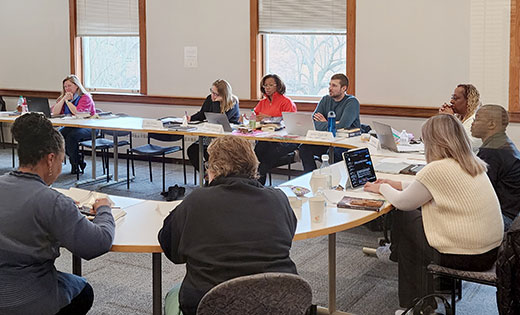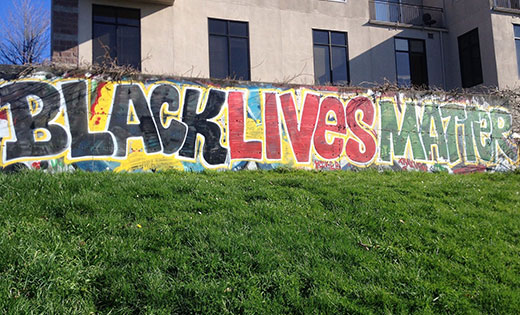Hybrid Doctor of Ministry in Intergenerational Black Church Studies
JOIN THE NEXT Intergenerational Black Church Studies COHORT
 Pittsburgh Theological Seminary's hybrid Doctor of Ministry (D.Min.) in Intergenerational Black Church Studies degree program invites pastors and faith-based leaders to deepen their ministry by meaningfully exploring the Black church's role across generations. The three-to-four-year cohort model fosters a supportive community of ministers united in a shared commitment to advance the position of the Black church.
Pittsburgh Theological Seminary's hybrid Doctor of Ministry (D.Min.) in Intergenerational Black Church Studies degree program invites pastors and faith-based leaders to deepen their ministry by meaningfully exploring the Black church's role across generations. The three-to-four-year cohort model fosters a supportive community of ministers united in a shared commitment to advance the position of the Black church.
Invest in the Future of Black Church Leadership
Grounded in the rich history of the Black church, this unique D.Min program unites participants around critical discussions of faith, culture, and liberation.
- Discover how ecclesial and social movements shape and sustain Black church life and gain insights from traditional and unconventional spiritual expressions.
- Address critical themes, such as the interplay between institutional and non-institutional forces, the influence of evolving digital landscapes, and the complexities of racial constructs.
- Adapt ministry for today's challenges while drawing from generations of wisdom and resilience in the Black church.
Accessibility is central to this program's mission. By reducing financial barriers and offering in-person classes for working professionals during concentrated blocks of time, Pittsburgh Theological Seminary allows more leaders to acquire critical skills and deepen their impact within their communities.
Hear from Our Faculty
Careers in Black Church Studies
With a Doctor of Ministry in Intergenerational Black Church Studies, students can pursue rewarding careers in faith-based and community organizations, serving as pastors, denominational leaders, and non-profit directors. Students gain academic knowledge and practical tools for impactful, culturally relevant ministry so they can shape policy, address social challenges, and guide congregations with a deep understanding of the Black church’s historical and present-day influence.
Program Details
Explore key elements of the hybrid Doctor of Ministry in Intergenerational Black Church Studies, including the application process, costs, curriculum highlights, and unique cohort schedule.
How to Apply
The intergenerational Black church studies focus accepts applications on a rolling basis. With limited cohort spots, we encourage applicants to apply early for the best chance of admission. Applicants can also request placement on a waitlist if a cohort reaches capacity. Review admission requirements for the Doctor of Ministry degree.
E-mail the admissions team at or call 412-924-1365 for more information about the application process.
Prerequisites
For program eligibility, applicants must hold a Master of Divinity (M.Div.) or an accredited master's degree in a field related to their ministry context.
Cost and Financial Aid
See the Seminary's Cost of Attendance page to learn more about the costs for this DMin cohort.
The Doctor of Ministry degree program offers financial aid and scholarships to support eligible students. One of these opportunities is the Expanding Access to Theological Education Scholarship, which helps cover student tuition, fees, and living expenses.
Note: Federal loans are not available for this program.
Course Topics
Intergenerational Dynamics
Examine historic intergenerational dynamics across various institutions and movements, primarily within Black Christian traditions. This topic emphasizes historical, theological, and sociological factors that shaped these dynamics and their importance for understanding Black socio-religious practices today.
Research Methods Seminar
Gain an introduction to a variety of research methods and practices in practical theology, with particular attention to ethnography.
Theological Engagement
Explore community engagement and participation in more significant social movements as an expression of and as distinct from formal Black church institutional practices. Students theologically examine social movements through biblical and other historical narratives, implementing a social-political lens and raising questions about how today's church writes its history in contemporary movements.
Design Thinking/Ecologies of Ministry
Engage with current ministry in Black church traditions, focusing on aesthetics, materiality, and the significance of social context. The topic introduces students to design thinking principles as tools to lead congregations in imagining possibilities for ministry in a specific setting.
Black Churches and Scripture
Discover how Black churches engage with Scripture as a living witness, with particular attention to hermeneutics and their relationship with sociocultural location.
Proclamation/Witness/Community Literacy
Examine forms of sacred proclamation in Black church traditions, including preaching and artistic and aesthetic expression, and how these acts reflect an awareness of specific contexts.
Gender and Black Church Leadership
Investigate gender dynamics in Black church traditions and how these dynamics influence conceptions of community and leadership opportunities.
Leadership and Endurance
Explore sources of spiritual sustenance from Black church traditions and the significance of spiritual practice in ethical formation.
Black Church Responsiveness to Issues
Analyze pressing social issues affecting Black communities in the United States and the church’s role in responding to those challenges.
Mobilizing Global Blackness
Consider the global impact of modern social movements and the role of Black church traditions in that larger ecosystem.
Intergenerational Black Church Final Project
As part of the Intergenerational Black Church Studies focus, students must complete a doctoral project and paper demonstrating the candidate's ability to identify a problem, issue, or concern in their ministry, integrate appropriate theological, biblical, and professional resources, and develop a method for resolution.
The doctoral project and paper must reflect the depth of theological insight and its positive integration within the practice of ministry.
Online and In-Person Class Schedule
The hybrid Intergenerational Black Church Studies cohort will meet in person for two weeks in January and June, with sessions held in Pittsburgh and at students' ministry sites. This focus will have two mentors—a faculty mentor and a practitioner mentor—who will work together to guide participants. Additionally, a cohort facilitator will host monthly online classes.
Current Cohort Schedule
|
Date |
Class |
|---|---|
|
June 2-6, 2025 |
DM515 Intergenerational Dynamics |
|
June 9-13, 2025 |
DM505 Introduction to Research Methodology |
|
Jan. 12-16, 2026 |
DM555 Proclamation/Witness/Comm Literacy |
|
Jan. 19-23, 2026 |
DM525 Theological Engagement |
|
June 15-19, 2026 |
DM 575 Leadership Vitality through Spiritual and Ethical Practice |
|
June 22-26, 2026 |
DM565 Gender amd Black Church Leadership Gender and Constructive Leadership in Black Churches: Exploring Systems, Ethics, and Hopes |
|
Jan. 18-22, 2027 |
DM545 Black Churches and Scripture: Black Hermeneutics as a Core Practice Across Generations |
|
Jan. 25-29, 2027 |
DM595 Mobilizing Global Blackness: Cross-National Racial Consciousness in Socio-Religious Movements Today |
|
June 7-11, 2027 |
DM535 Design Thinking and Ecologies of Ministry: Social Context, Aesthetics, and Formation |
|
June 14-28, 2027 |
Thesis Practicum |
|
Final Project |
DMIBCFP Intergenerational Black Church Studies Final Project |
Hear from Our Students
LEARN MORE ABOUT PITTSBURGH Theological Seminary's Intergenerational Black Church Studies Program
Embrace the opportunity to join a transformative community dedicated to leading the Black church forward in an ever-changing world. Apply now to Pittsburgh Theological Seminary’s hybrid Doctor of Ministry in Intergenerational Black Church Studies.




